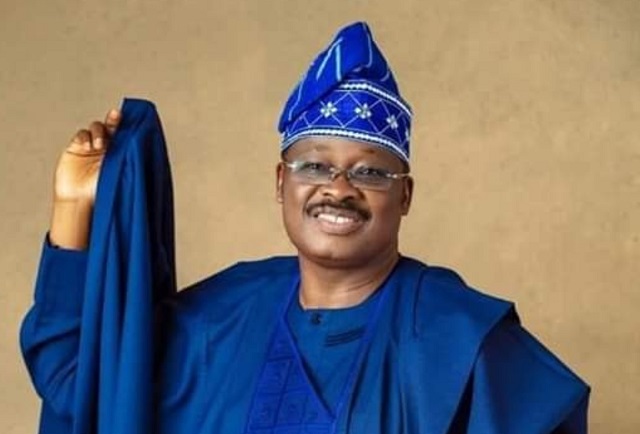Unlike my wont, words failed me repeatedly this morning. Ever imagine billows of smoke failing to sprout out of the blacksmith’s forge? Or the canary suddenly failing to spit its melodious rhythm? But that has been my abiding forte in the last one hour or so.
Writing, cancelling, rewriting, erasing, rewording and cancelling outright were my back-and-forth lot as I tried to pen an elegy to Abiola Ajimobi, a man who, for four years, was my boss. I had had to substitute “is” for “was” while diffidently refusing to append “late” as prefix to the name of a man I ate dinner with about seven weeks ago. Similar to Ayinla Omowura, Yoruba Apala musician’s query of the dead body of Yusuff Olatunji, another Sakara music great, Ibo ni’ku ba e to fi ri e pa? (why or how did you let down your guard and allow Death pierce you with its cowardly dagger?) I cannot but ask Ajimobi how and when he consented to the effeminate aggression of death? As the soil opens its irreverent mouth and swallows Ajimobi today, I ask, why would Constituted Authority consent to that show of might by Death?
Right from the gate of his house at the Oluyole Estate area of Ibadan, you had a whiff that you were in the home of a typical Nigerian sanmonri (elite) and their usual dread of death. Or, in the words of Ken Saro-Wiwa’s corrupted English-written Souza boy, an elite afraiding to die. The gateman pretended to be blind to any acquaintance with anyone, except you thoroughly washed your hands in the trough of water placed by the gate. He then apologized profusely after you had acquiesced to the wishes of the owner of the house, pleading that he didn’t want to lose his job. Guests’ faces donned in masks which a few months earlier would have looked outlandish, the gateman nevertheless looked us up like a virologist looks through the microscope for a hidden virus, just to be certain we had not flouted the Supreme Law of the home.
Then we walked into Ajimobi’s modest compound where you find sanmonri mixing with afinju (aesthetic) in equal blend. Mrs. Ajimobi sat with a couple of her aides a few meters away, squeezing her face to identify the three gentlemen masqueraded from recognition by their COVID-19-imposed masks. “Oh, it’s AG!” she suddenly said, upon identifying Adebayo Mutalubi Ojo, her husband’s Attorney General in his first term as governor. And then me; and another friend of ours, Yisau Ganiyu, on the visit.
We then sat in the Ajimobis’ well-laid out living room. Splendid in aesthetics, certainly product of someone who had an eye for beauty, Ajimobi himself walked in. With brisk gaits like that of a 21-year old, he would rather you shot him than gag him from lending his opinion on an issue. “Do you know that scientists have revealed that even those masks you wore can do you some harm?” he began as we exchanged pleasantries. We then went into debates on the effectiveness of the face mask. As we sat, he asked that we social-distanced by spreading on each of the elegant couches that decorated his living room. His two other guests being Muslims, since it was the month of the Islamic Ramadan fast, he sidestepped them and offered me assorted fruits. He said he never counted the days of the fasting already expended but when told that the day marked the tenth, he merely nodded.
Though we couldn’t honestly discern any premonition that Ajimobi’s departure was near, he showed unusual reconciliatory attitude this day, like someone in a hurry to make amends, lest time caught up with him. For instance, Ajimobi accepted overtures by Ibadan elders to reconcile with a senior legal practitioner whom he concretely laid his infractions against. He spent most part of that evening receiving phone calls in that regard. He quoted a psychoanalytical study which captured the mind structure of serial and impulsive liars.
Then came the time to break the day’s fast. Before we left that section of the house that also doubled as his office, I handed him two autographed copies of the book I had just written. You taught us that nothing else but excellence suffices, I wrote. Ajimobi found it very enchanting and expressed how excited he was that we were doing him proud out of office.
He implored us to join him at the breaking of fast table, which, with the benefit of hindsight now, was a replica of the biblical last supper. Madam had had the table decorated with all kinds of foods. That night, as if he knew that it was the last time he and I would be seeing, he seemed too pleased to please my friends and me. Was a wrap of amala enough for me? he asked about twice. There were more chunks of meat in the bowl, he again prompted, just for us to have our fill. He explained why, for him, he didn’t value swallow as cuisine, even as he ate very small portion of rice.
The 7pm curfew was long past, I said, reminding him of the need for me to take my leave. Ajimobi walked us to our cars, even as we chatted like school boys. He wore that flowing caftan which I had known him with for years. His wife made it for him, he told us. As we got to the outside of the gate, he asked one of his security aides why he hadn’t gone home. He told him his house was far and once he didn’t leave on time, he couldn’t again for that day. There and then, Ajimobi granted him the grace to always leave early so that he could be with his family.
As I leapt into my car, Ajimobi waved us bye. Instinctively, I looked at him walking away. He seemed to be in a hurry to depart, even as he walked into the darkness.
I first met Ajimobi a few months after he left the National Oil as Managing Director, in 2003. He had expressed the desire to go into politics. His friend and broadcasting giant, Yanju Adegbite, had requested I interviewed him in this same Oluyole house of his, for the Tribune. I saw in the handsome man a very self-assured, knowledgeable man with fascinating mental depth. I was however afraid for him that in a society that was mindful of personal hoisting of self mental worth, he would be an easy prey for profiling as arrogant. No question hit him by surprise. He had responses. Adegbite tells anyone that I rejected Ajimobi’s traditional handshake that afternoon.
Fate was to bring us together again around 2009. He had constituted a strategy team preparatory to the 2011 election contest and someone had sourced me out. We sweated to situate his candidature and when he won and opposition against my nomination as his media aide mounted, Ajimobi fought through his preference for me, almost combating Late Alhaji Lam Adesina, the party leader.
For four years with Ajimobi in government, I worked under an intensely demanding boss. I almost threw in the towel in the first two years as I couldn’t cope with his amazing strides. A nocturnal being of the Nigerian political class’ hue, he slept most times in the very early hours of the day, holding meetings and deciding governmental policies. For me, that was a Capital No. While he gave me free hand to manage his media portfolio, he couldn’t withstand mediocrity or shallowness. You had to make power point presentations to him on how you hoped to plot his media management graph.
The first bout I had to fight was how to strip him of his fancies of necklace, agbada and an unsparing tongue. Agbada and necklace signposted elitism and as such, dis-advertisement for leadership of an agrarian, civil service state like Oyo. His besotting inseparability with his wife also boomeranged in a patriarchal state as Oyo where the perceived thought of a woman co-handling the wheels of state sounded absurd. So, all sorts of damaging euphemistic clichés were manufactured to denigrate him as a sissy. I devised my own way of managing this typecast. They however seemed to get at him. One night at his house, going through a document with Toye Arulogun, Gbolagade Busari and me and I stepped aside to receive my wife’s call, he had jokingly asked if that was not me abandoning a governor on seat and answering my wife’s call. “And yet they would say Ajimobi is too besotting to his wife!” We all reeled with laughter.
My first challenge in the management of Ajimobi – the necklace – was removed by Dotun Oyelade in a piece he did for the Tribune about a week into the administration. A seemingly innocuous last statement in the piece – a ‘by the way’ statement, demanded whether the 18-karat gold necklace he noticed on Ajimobi’s neck was procured from Dubai. That weekend, necklace leapt out of Ajimobi’s neck and I never saw it ever since. The other two, after I psychoanalyzed him, I let them be, seeking instead to dig my way round them. In my psychoanalysis, I found out that the agbada and unsparing tongue that got Ajimobi a horde of enemies, were projections of a childhood shield that Ajimobi deployed to defend his austere stature from bullies while growing up. “If you say I over-talk, I have been doing that for over sixty years of my life, so don’t expect that I’d change overnight,” he once said. What many people didn’t know was that Ajimobi deplored his tongue as a mamba does when it faces attacks. Deep within him, he couldn’t hurt a fly and would recoil when faced with a superior adversary. He could also barely stand by and watch a man suffer.
Aside unleashing an infrastructural revolution unknown to Oyo State in his years in office, thousands individually benefited from him and his government. I watched him transit from a very frugal spender pre-office to a very generous man while in and out of office.
Ajimobi revered intellect. Doubling as his speech-writer in his first four years in office, passing those scripts through his line-by-line scrutiny became a major everyday challenge. One day, preparatory to a state broadcast, the Chief of Staff, Dr. Adeolu Akande and me, had our doctoral degrees thoroughly defoliated when he painted our draft speeches with his traditional red biro. I kept some of those red-pen soiled drafts. We faced same challenge while co-writing his first inaugural speech in May, 2011. At exactly 3a.m on May 29, 2015, I left this same Oluyole house of his, after the last draft of his inaugural speech passed his eye-of-the-needle final assessment. We had been doing back-and-forth of corrections from about 10pm, May 28, when I brought the first draft.
Ajimobi had his foibles like every other human being. He was nevertheless a great man who wanted to re-situate Oyo State as a modern, clean state devoid of its acquired renown as capital of political brigandage and dirt. There were equivocations and complexities in this bid of his. He must be regretting while he was stuck in those machines of the Lagos hospital that he didn’t make Oyo a health tourism destination as he did for road infrastructure.
He made impacts in the lives of so many people and it would have been nice if he overcame the deadly COVID-19 ailment to behold the horde of people who raised prayers for his recovery. Someday, we all – those who excoriated him and those who lauded him – would come to the convergence that he meant well for Oyo State. Right now, you cannot decipher from the mix: a horde of sympathizers trying to outdo one another in shedding crocodile tears at the departure of a man who they only yesterday demonized and those who genuinely feel his absence. Yoruba, in their tempered anger at the third group – those who may be exhibiting sycophancy at Ajimobi’s departure – say, eeyan o sunwon laaye; ijo a ba ku laa d’ere. Translated, they wonder why a man who awhile ago was a recipient of aspersions would, at death, turn into a beautiful carved effigy.
Rest well, boss.
- Dr Festus Adedayo, popular columnist sent this in from Ibadan. He was at a time, the spokesperson for Governor Abiola Ajimobi





































































